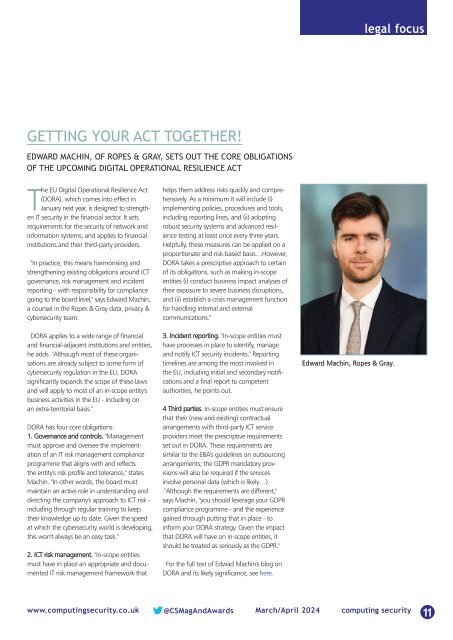CS Mar-Apr 2024
You also want an ePaper? Increase the reach of your titles
YUMPU automatically turns print PDFs into web optimized ePapers that Google loves.
legal focus<br />
GETTING YOUR ACT TOGETHER!<br />
EDWARD MACHIN, OF ROPES & GRAY, SETS OUT THE CORE OBLIGATIONS<br />
OF THE UPCOMING DIGITAL OPERATIONAL RESILIENCE ACT<br />
The EU Digital Operational Resilience Act<br />
(DORA), which comes into effect in<br />
January next year, is designed to strengthen<br />
IT security in the financial sector. It sets<br />
requirements for the security of network and<br />
information systems, and applies to financial<br />
institutions and their third-party providers.<br />
"In practice, this means harmonising and<br />
strengthening existing obligations around ICT<br />
governance, risk management and incident<br />
reporting - with responsibility for compliance<br />
going to the board level," says Edward Machin,<br />
a counsel in the Ropes & Gray data, privacy &<br />
cybersecurity team.<br />
DORA applies to a wide range of financial<br />
and financial-adjacent institutions and entities,<br />
he adds. "Although most of these organisations<br />
are already subject to some form of<br />
cybersecurity regulation in the EU, DORA<br />
significantly expands the scope of these laws<br />
and will apply to most of an in-scope entity's<br />
business activities in the EU - including on<br />
an extra-territorial basis."<br />
DORA has four core obligations:<br />
1. Governance and controls. "Management<br />
must approve and oversee the implementation<br />
of an IT risk management compliance<br />
programme that aligns with and reflects<br />
the entity's risk profile and tolerance," states<br />
Machin. "In other words, the board must<br />
maintain an active role in understanding and<br />
directing the company's approach to ICT risk -<br />
including through regular training to keep<br />
their knowledge up to date. Given the speed<br />
at which the cybersecurity world is developing,<br />
this won't always be an easy task."<br />
2. ICT risk management. "In-scope entities<br />
must have in place an appropriate and documented<br />
IT risk management framework that<br />
helps them address risks quickly and comprehensively.<br />
As a minimum it will include (i)<br />
implementing policies, procedures and tools,<br />
including reporting lines, and (ii) adopting<br />
robust security systems and advanced resilience<br />
testing at least once every three years.<br />
Helpfully, these measures can be applied on a<br />
proportionate and risk-based basis…However,<br />
DORA takes a prescriptive approach to certain<br />
of its obligations, such as making in-scope<br />
entities (i) conduct business impact analyses of<br />
their exposure to severe business disruptions,<br />
and (ii) establish a crisis management function<br />
for handling internal and external<br />
communications."<br />
3. Incident reporting. "In-scope entities must<br />
have processes in place to identify, manage<br />
and notify ICT security incidents." Reporting<br />
timelines are among the most involved in<br />
the EU, including initial and secondary notifications<br />
and a final report to competent<br />
authorities, he points out.<br />
4 Third parties. In-scope entities must ensure<br />
that their (new and existing) contractual<br />
arrangements with third-party ICT service<br />
providers meet the prescriptive requirements<br />
set out in DORA. These requirements are<br />
similar to the EBA's guidelines on outsourcing<br />
arrangements; the GDPR mandatory provisions<br />
will also be required if the services<br />
involve personal data (which is likely…).<br />
"Although the requirements are different,"<br />
says Machin, "you should leverage your GDPR<br />
compliance programme - and the experience<br />
gained through putting that in place - to<br />
inform your DORA strategy. Given the impact<br />
that DORA will have on in-scope entities, it<br />
should be treated as seriously as the GDPR."<br />
For the full text of Edwad Machin's blog on<br />
DORA and its likely significance, see here.<br />
Edward Machin, Ropes & Gray.<br />
www.computingsecurity.co.uk @<strong>CS</strong>MagAndAwards <strong>Mar</strong>ch/<strong>Apr</strong>il <strong>2024</strong> computing security<br />
11
















